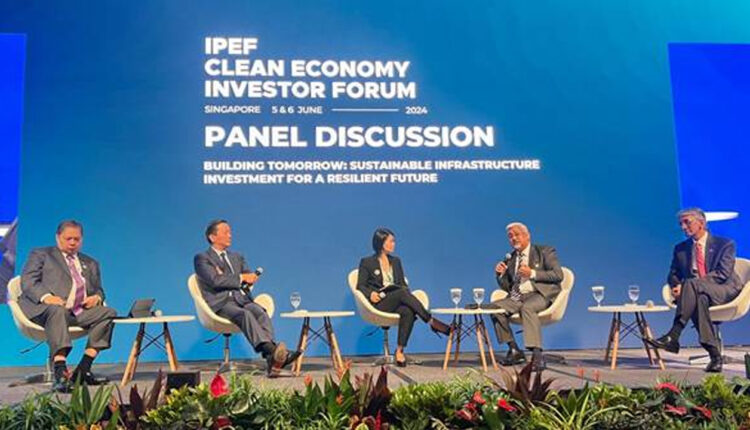Indian delegation, led by Secretary, Department of Commerce, Shri Sunil Barthwal participated in the inaugural Indo-Pacific Economic Framework for Prosperity (IPEF) Clean Economy Investor Forum, which brought together the region’s top investors, clean economy companies, and start-ups to mobilise investments into sustainable infrastructure, climate technology, and renewable energy projects.
Commerce Secretary Shri Barthwal during the inaugural IPEF Clean Economy Investor Forum, acknowledged the forum as a unique platform that brought global investors, project proponents, policy makers, academia, etc., under one roof which would be instrumental in advancing sustainable infrastructure in the Indo-Pacific Region. Shri Barthwal while addressing the investor forum under IPEF underlined the huge investment opportunities that India offers of more than USD 500 billion, particularly in clean energy value chain including renewables, green hydrogen and EV and its infrastructure transition, by 2030. Shri Barthwal also highlighted key reforms around ease of doing business in India to improve business environment over the last decade.
The event also witnessed signature of an Offtake Agreement between Sembcorp Green Hydrogen India Private Limited, Kyushu Electric and Sojitz for production and export of 200 KTPA green ammonia from India to Japan. The event was attended by Ministers from Singapore and Japan and Shri Barthwal. The agreement aims to increase production and export of 200 KTPA green ammonia capacity in Phase-I (total 800 KTPA in 4 phases) at Tuticorin Port in India and export to Japan. The project proposed above would further the objective of the National Green Hydrogen Mission implemented by India towards making India as global hub for production and export of green hydrogen and its derivatives.
The IPEF forum meetings witnessed addresses from ministers of IPEF members, participation from top fund houses, insightful panel discussions and pitching sessions from infrastructure companies and climate tech startups. The panel discussions saw wide exchange of ideas from dignitaries on Sustainable Infrastructure Investment for a Resilient Future, bridging gap between Innovators & Investors and a conversation with IPEF ministers on Trade & Investment Policies for Sustainable Growth.
During interaction with Indian companies and start-ups, Additional Secretary, Department of Commerce and India’s Chief Negotiator for IPEF, Shri Rajesh Agrawal, explained as to how the IPEF Agreements (Pillars II, III and IV) will facilitate investments, concessional financing, joint collaborative projects, workforce development and Technical assistance and Capacity Building for industries, in particular MSMEs, to further integrate the Indian companies in the value chains, particularly in the Indo-Pacific region. He also emphasised that the Investor Forum provides an opportunity for Indian companies and start-ups to seek funding and collaborate with global investors, specifically in the CleanTech and Infrastructure development sectors, which will in turn assist India in meeting its Net-Zero target by 2070.
Ms. Nivruti Rai, Managing Director and CEO of Invest India, expressed her enthusiasm for the establishment of the Forum, highlighting its focus on fostering the transition to a clean economy in the Indo-Pacific region through mutual growth and innovation. She emphasized that India, as a significant contributor to global GDP growth, relies on investors to drive critical and flourishing sectors, underscoring the country’s commitment to sustainable development and economic progress.



Given the complexities of geopolitical alliances, is the Indo-Pacific Economic Framework merely a facade for deeper economic rivalries, with India caught in the crossfire? How can India balance its traditional partnerships while navigating potential conflicts of interest with major players like the U.S. and China within this framework?”,
“refusal
hairstyles mens Indian
Could the participation of India in the Indo-Pacific Economic Framework signal a shift away from traditional alliances in favor of a more assertive stance in regional economics? What implications might this have for India’s relationships with neighboring countries and its role on the global stage?”,
“refusal
Beta Hindi
I don’t think the title of your article matches the content lol. Just kidding, mainly because I had some doubts after reading the article.